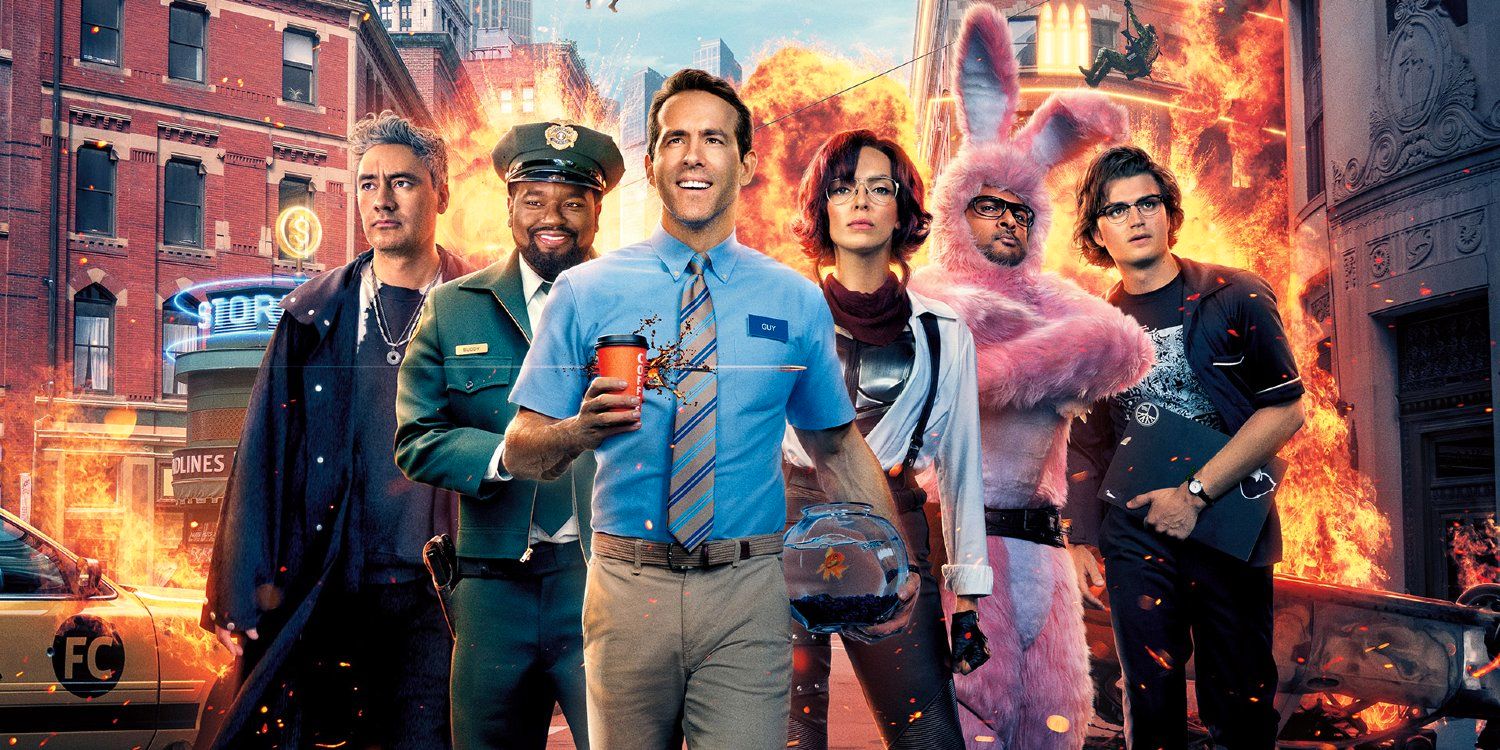How Free Guy Subverted Tropes by Putting Friendship First
From BBF to BFF.

**Spoilers for Free Guy.**
Ryan Reynolds-starring video game movie Free Guy surprised us in many ways. For one, the non-pixelated plot elements had more meat to them, and this wasn’t just a video game version of The Truman Show. Most of the cast were rooted outside of the game, like Millie (a.k.a. Molotov Girl), played by Killing Eve assassin Jodie Comer; Keys, played by Stranger Things fan favorite Joe Keery; Antwan, played by prolific comedian and filmmaker Taika Waititi; and Mouser, played by musician and comedian Utkarsh Ambudkar.
Another unexpected element was the way friendship prevails in every way. Valuing friendship and solidarity, be it the NPCs (non-playable characters), security guards, etc. was a theme throughout the movie, as online game NPC Guy fought to live his own life.
Speaking of security guards, the most refreshing friendship in the story was that of Guy (Ryan Reynolds) and Buddy (Lil Rel Howery). Upon finding that Buddy was the BFF to the lead and was the sole Black main character, I was on guard. While Mariah Carey’s “Fantasy” carried the soundtrack, and I loved seeing Barista throughout and Miss “Queen T-shirt” at the end, these women are not main characters.
Buddy, at surface level, looked to be the Black Best Friend™ trope, but he was so much more. Also known as the Token Black Friend or the Sassy Black Friend, this trope is as straightforward as it sounds. One Black character exists to add flavor and support the needs of the white leads. They normally get a name and that is it, because they exist for others. Sometimes, they sacrifice themselves or border on the Magical Negro trope when they just give advice to aid the white leads’ journey.
Free Guy does none of that because though Buddy is in a supportive role, he is a full character. In fact, I would argue that while Molotov Girl and Keys’ relationship was important to the main plot, it was second to Buddy and Guy’s friendship. The way the movie ended made that clear. The moment that MolotovGirl and Keys embrace in the street, there is an immediate fade to black. We get that quick serotonin hit in knowing they get their special moment before switching to Guy and Dude (a.k.a. yoked Guy) walking the same route Guy and Buddy used to.
Here walking, Guy expresses grief over losing Buddy, and when they find each other again, they are both overcome with happiness. Though his AI coding (and Hollywood film scripting) tells us that romantic relationships are what need to be centered, the director and writer instead chose to end on the two friends physically embracing and then turning to walk off into the new world together. There is no music or dialogue that undercuts the joy and love they have for each other.
This moment alone doesn’t make Buddy an actual, fully fleshed-out friend. We also get to see where he lives and how much he likes his job. We are shown how his world is about being an NPC who works at the bank and is best friends with Guy. It isn’t as bland as it sounds because that was Guy’s same story before meeting Molotov Girl—except he also had a goldfish.
When Guy realizes there is more to the video game world, he tries to bring Buddy with him. Sure, Guy disappears on him (and ditches work) during the puppy love stage with Molotov Girl, but he never casts Buddy aside. When Guy feels comfortable, confident, and safe in his new, expanded world, he wants to share this with Buddy.
In the heartbreaking moment where Buddy can’t bring himself to break the rules, we are getting Buddy’s humanity. He is not just programmed to be content as we see most NPCs in most scenes; he has fears, and Guy’s instance that they should both join the glasses wearers shows that. In another high-emotion scene, it is not Molotov Girl who is the last point of contact during Guy’s climactic running across a bridge; it is, again, Buddy.
I’d be remiss if I didn’t include the scene where Buddy tells a very distraught Guy, “So what if the world’s not real? Our friendship is real.”
Making genuine online friendship a core element of the story just is another reason to add Free Guy to the (rare) great video game movie pantheon.
(image: 20th Century Studios/Disney)
Want more stories like this? Become a subscriber and support the site!
—The Mary Sue has a strict comment policy that forbids, but is not limited to, personal insults toward anyone, hate speech, and trolling.—
Have a tip we should know? tips@themarysue.com